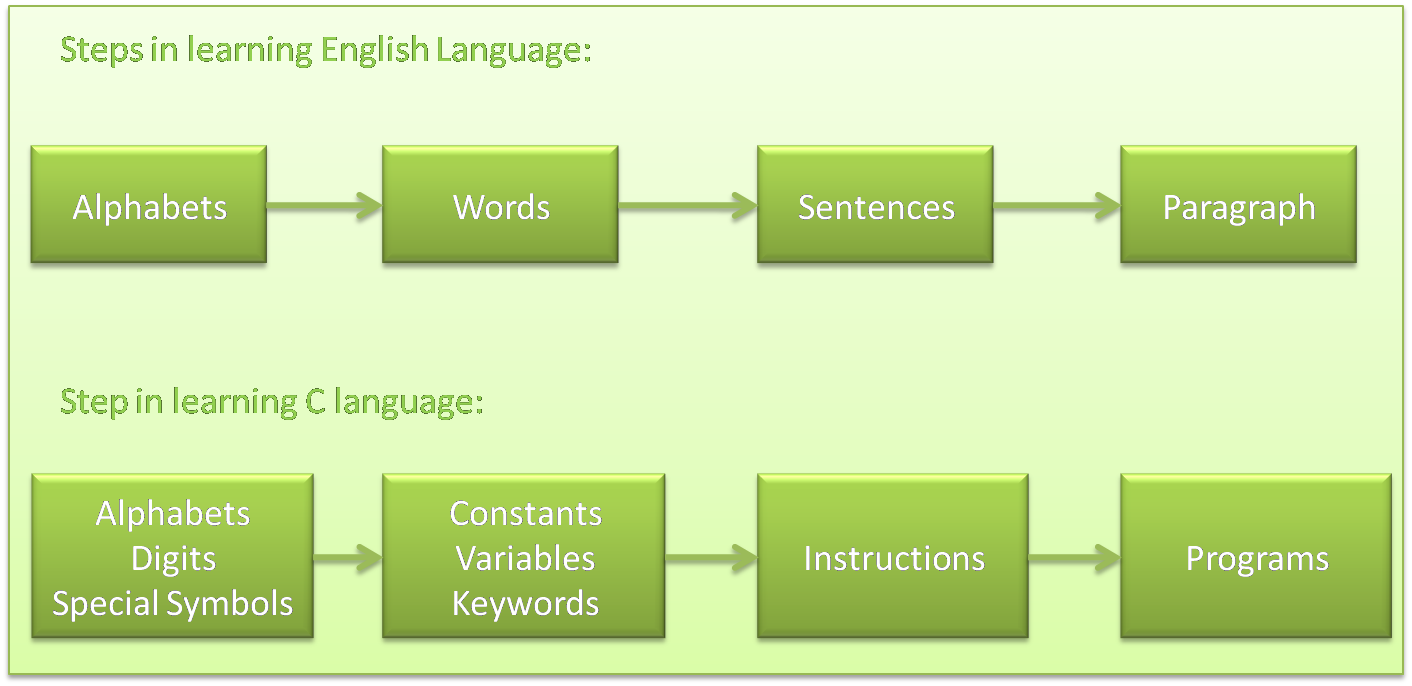Want to unlock the power of C programming? Whether you’re a coding novice or have experience with other languages, this comprehensive guide will help you conquer C. We’ll cover everything from the foundational principles to advanced techniques, providing you with the resources and knowledge you need to become a proficient C programmer.
The classical method of learning English is to first learn the alphabets used in the language, then learn to combine these alphabets to form words, which in turn are combined to form sentences, and sentences are combined to form paragraphs.

Learning C is similar and easier. Instead of straight-away learning how to write programs, we must first know what alphabets, numbers, and special symbols are used in C, then how using them constants, variables and keywords are constructed, and finally how are these combined to form and instruction.
Why Learn C? The Foundation of Modern Programming
C is a powerful and versatile language that has stood the test of time. It’s the backbone of many operating systems, including Windows, macOS, and Linux, and it’s widely used for system programming, embedded systems, game development, and more. By learning C, you’ll gain a deep understanding of how computers work and develop the skills to write efficient, high-performance code.
7 Steps to Learning C Programming
- Grasp the Fundamentals of Programming:
Start by understanding core concepts like variables, data types (integers, floating-point numbers, characters), operators (arithmetic, logical), control flow (if/else statements, loops), and functions. Even if you’re familiar with other languages, revisiting these basics in the context of C will solidify your foundation.
- Set Up Your C Development Environment:
To write and run C code, you’ll need a C compiler (e.g., GCC, Clang) and a text editor or integrated development environment (IDE) (e.g., Visual Studio Code, Code::Blocks). Follow installation instructions for your operating system and choose tools that suit your preferences.
- Dive into C Syntax and Structure:
C has a structured syntax with specific rules for semicolons, curly braces, and function declarations. Take the time to learn these rules thoroughly, as even minor errors can cause your code to fail.
- Start with Simple C Programs:
Begin your coding journey with small, manageable programs. Practice writing code to print messages to the console, perform basic calculations, and work with variables. These initial exercises will build your confidence and familiarize you with the C syntax.
- Explore Control Flow and Functions:
Master conditional statements (if/else, switch) and loops (for, while, do-while) to control the flow of your programs. Learn how to define and use functions to modularize your code and make it more reusable.
- Tackle Data Structures and Algorithms:
Once you have a grasp of the basics, explore fundamental data structures like arrays, linked lists, stacks, and queues. Learn how to implement common algorithms like sorting and searching to solve computational problems efficiently.
- Level Up with Advanced C Topics:
Delve into more advanced concepts like pointers, dynamic memory allocation, file I/O, and data structures like trees and graphs. Explore libraries and frameworks that can enhance your C programming capabilities.
Resources for Learning C Programming
- Online Courses: Platforms like Coursera, Udemy, and edX offer comprehensive C programming courses for beginners and experienced programmers.
- Books: Classic textbooks like “The C Programming Language” by Brian Kernighan and Dennis Ritchie remain valuable resources.
- Tutorials and Websites: Numerous websites and blogs provide tutorials, examples, and exercises for learning C.
- Practice: The key to mastering C is practice. Work on coding challenges, participate in online forums, and build projects to solidify your understanding.
FAQs: How to Learn the C Language?
Q: Is C a good language for beginners?
A: C can be more challenging than some other languages for beginners due to its lower-level nature and manual memory management. However, it’s an excellent foundation for understanding computer programming fundamentals.
Q: What are the career opportunities for C programmers?
A: C programmers are in demand in various fields, including systems programming, embedded systems, game development, and high-performance computing.
Q: What are some recommended C compilers?
A: Popular C compilers include GCC (GNU Compiler Collection), Clang, and Microsoft Visual C++.